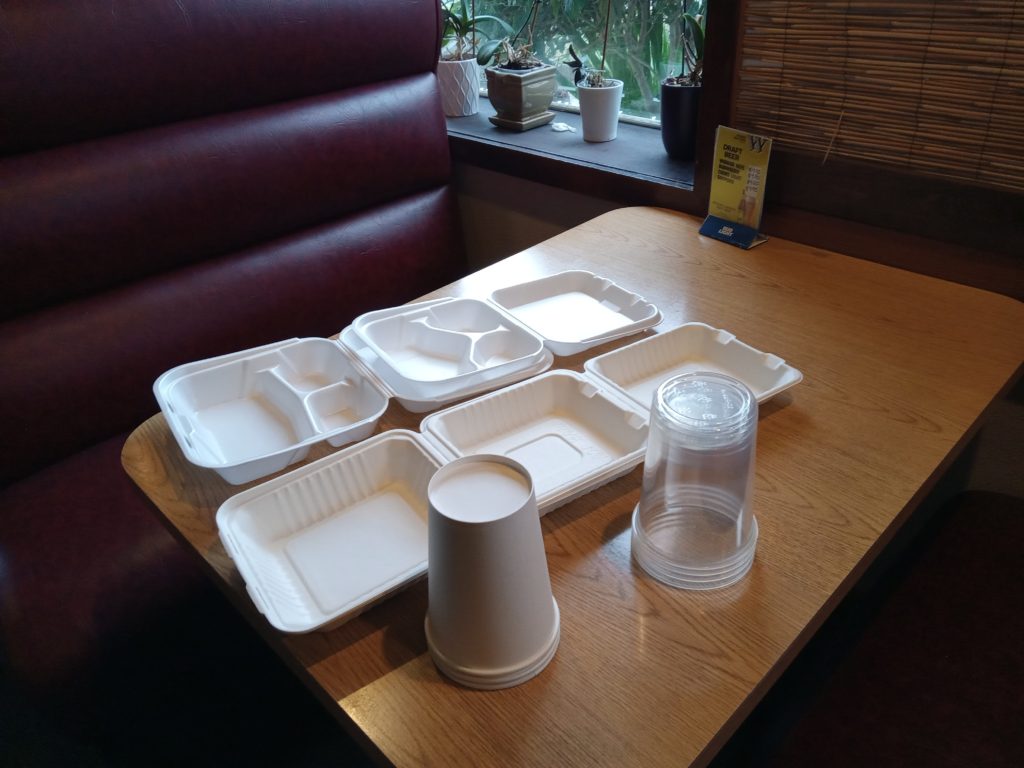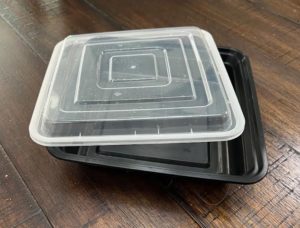
By KENNETH LIPP/YachatsNews
To-go food is changing in Newport.
Taking home that leftover salad from the cafe or burrito from the drive-through could look a lot different now for diners at Newport’s restaurants as the city enacts one of Oregon’s strictest bans on single-use plastic food containers. More coastal cities could be next.
For many restaurants, the ordinance is not a big deal — they switched to compostable take-out containers years ago. But others, mostly smaller operations, are struggling with the change and scrambling to find the correct – and affordable – containers.
With few exceptions, the estimated 100 Newport businesses serving prepared food to the public can now only do so with reusable or compostable materials. Plastic cups are still allowed to go, but not ones made of expanded polystyrene plastic, frequently and inaccurately referred to by the brand name Styrofoam.

Utensils inside restaurants must be re-useable. If you want plastic utensils with your to-go order remember to ask – servers are not supposed to automatically included them anymore. Same thing for plastic condiment cups and packets.
The Newport City Council adopted the ordinance more than a year ago at the urging of Surfrider Foundation, the nonprofit dedicated to conservation of Pacific Northwest shorelines, and in keeping with its long-term environmental plans. City staff worked with representatives from Surfrider, a Newport restaurant, grocery store and waste management company to develop the regulations.
Originally set to go into effect last March, the council delayed enforcement until Jan. 1 to allow businesses to use up their old stock and find new supplies.
The phasing out of single-use plastic and especially plastic foam containers is an international trend. Foam is technically recyclable, but its composition makes collection and transportation so energy intensive that it can outweigh the environmental benefits of recycling. It’s also particularly harmful to the ecosystem due to its easy disintegration into microplastic, which is difficult to clean up and makes its way into the food chain.
Eight states, including Washington, and dozens of large cities nationwide have enacted polystyrene foam bans, and it’s banned in more than 70 countries.
Although a statewide ban failed in the 2019 Oregon Legislature, Portland, Eugene, Silverton and other cities have enacted bans and “by-request-only” regulations on single-use plastic. Florence has banned foam containers and plastic bags since 2017, and a polystyrene foam ban in Lincoln City has been in effect for 18 months.
Waldport city manager Dann Cutter said Waldport City Council could take up the issue for discussion as soon as next month. The Yachats City Council discussed the idea several years ago, but the city never progressed beyond the talking stage as the coronavirus pandemic hit.
Restaurants adjust
The city of Newport sent food sellers a letter several weeks ago regarding the impending enforcement of the ordinance starting Jan. 1.
Dylan McEntee, co-owner and vice president of operations for Mo’s Seafood and Chowder, said nothing changed for the Bayfront restaurant this week — they moved away from foam plastic 20 years ago and to compostables about five years later. McEntee said his mother hated to see their logo on items discarded along the section of road the company adopted, which initially prompted the inventory change.

At the time, McEntee said, the alternative materials were about 50 percent more expensive, but the difference has since dropped to about 25 percent. He also noted that plastic waste reduction was increasingly expected by customers and important to other Bayfront restaurant proprietors with whom he regularly communicates.
The Taproom at Nye Creek was also set to go, although manager Lance Lyons noted it might take time to train staff not to automatically include utensils or condiments, as stuffing them into to-go bags has become a matter of muscle memory.
“We switched to paper bags and containers about two years ago,” Lyons said, adding that customers and restaurant management were both sensitive to the issue of plastic litter given their proximity to the beach. He said most of the compostable containers are not significantly more expensive than their plastic predecessors.
“Foam would be cheaper, but we never liked the foam anyway,” Lyons said. “The only issue with these is things like sauces, then we need to use the more expensive containers with wax coating.”
Not everyone is so ahead of the game.
The city sent a letter to restaurant owners last June reminding them of the approaching requirement. But, Elena Rodriguez at Kum Yon, located just north of the Yaquina Bay Bridge, said they’ve only been able to acquire small batches of compostable materials at about double the price of their foam containers.
Rodriguez said they’ve considered adding a surcharge to cover the difference, as at least one local restaurant has done, but are reluctant to do that. Takeout is a significant share of the Chinese restaurant’s business.
“We also see that it’s a hard time for some to pay for their food,” Rodriguez said. “So how are they going to pay for that?”
Rodriguez said she and the owner of another restaurant with whom she discussed the new rules were confused about what products were allowed — for instance, what makes a plastic container “single use”?
The drive-through at Super Oscar’s Mexican often has a line of eight cars or more extending almost to the street. Manager Yuli Tafoya, whose father owns Oscar’s locations in Newport and Lincoln City, said the Newport restaurant was still transitioning to compostable materials.
Tafoya said the major supplier they use typically has the correct containers, but the price can vary and be prohibitively expensive. Sometimes they have to resort to buying them locally, which is also costly.
It’s a significant challenge at a time when food costs are substantially inflated, she said, and customers notice even minor adjustments in prices.
The rules
The city of Newport interprets “single-use” plastic to mean any containers made of plastic. Plastics marketed as reusable, recyclable and biodegradable plastics are not allowed. A city fact sheet on the ordinance says this is because no facilities in the region accept most plastics labeled recyclable and all composting facilities in Oregon ban compostable plastics.
One exemption are grocery stores that package and label to-go dishes like salads and can do so in clear plastic boxes. Those are being treated as food packaged by the manufacturer pre-sale, an exemption outlined in the ordinance.
Other exceptions in the new rules include:
- Food providers may have self-service stations with single-use plastic food ware.
- Single-use disposable straws attached to a beverage container are allowed, and single-use condiments that are an ingredient of a dish can be provided without asking (such as dressing with a salad).
- Plastic lids for food and drink containers are acceptable as long as the container itself is compliant.
- Food that’s provided free or at reduced price as a social service to vulnerable populations is exempt from the regulations.
- The city manager can grant extensions of up to six months to businesses that demonstrate an “undue hardship.”
Newport city manager Spencer Nebel said only one business has requested an extension.
Enforcement of the ordinance will be complaint driven.

“We’re not going to send the cops around to check restaurants,” said mayor Dean Sawyer. If customers notice a business is still using plastic, Sawyer asked that they first gently bring the new rules to staff’s attention before filing a complaint.
“I’m not expecting any citations in the first month,” Sawyer said. “But if we go to a restaurant and talk to them, and they tell us to pound sand, then we’d have to take more action.”
The ordinance says a first violation will result in a warning, and the second in the same 12-month period carries a $100 fine. A third citation in one year brings a $200 fine, followed by $500 fines for subsequent violations. The city won’t cite any one business more than once during a seven-day period.
- Kenneth Lipp is YachatsNews’ full-time reporter and can be reached at KenLipp@YachatsNews.com


